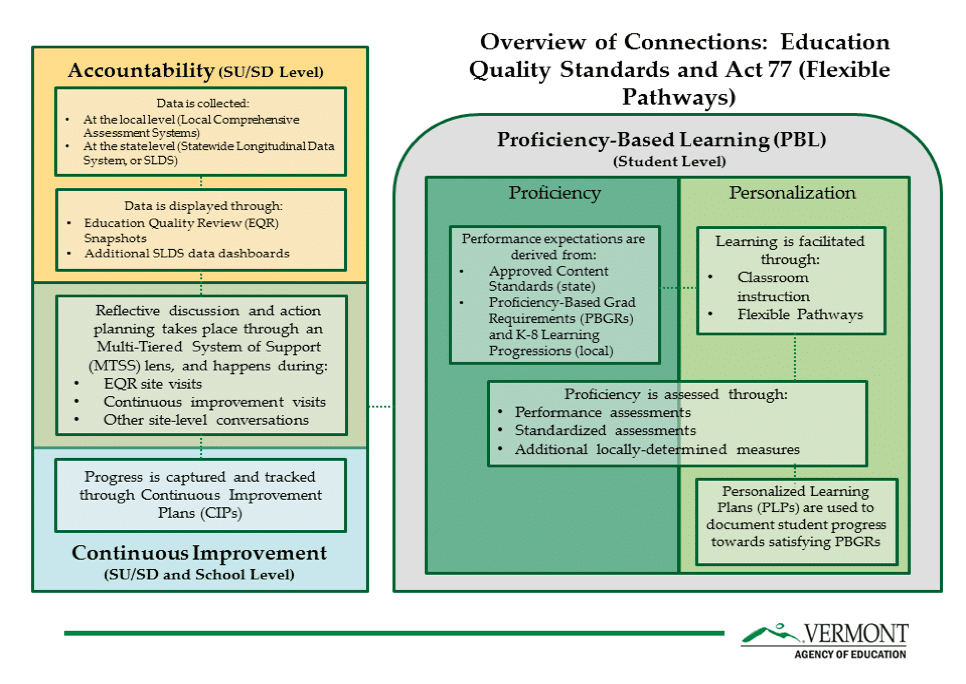Vermont’s Comprehensive, Statewide Approach to Personalized Learning
Education Domain Blog
 Vermont has pursued the most comprehensive statewide policy approach to personalized, proficiency-based learning.
Vermont has pursued the most comprehensive statewide policy approach to personalized, proficiency-based learning.
In 2013, the Vermont legislature passed Act 77, the Flexible Pathways Initiative and the Vermont State Board of Education approved Rule 2000: Education Quality Standards (EQS), which created the policy environment for personalized, proficiency-based learning to thrive in the state.
Important elements within these policies include proficiency-based graduation requirements, personalized learning plans, systems of assessments for learning, accountability for continuous improvement, flexible pathways, and educator and school leader development initiatives.
The following chart shows how these policy initiatives fit together.

All of these components work together to improve educational options and results for students. State standards and proficiency-based graduation requirements drive expectations for students. Personalized learning plans are aligned to and measure students’ progress towards the proficiency-based graduation requirements. These plans utilize the state’s flexible pathways to create individualized, highly-meaningful paths for students. Robust systems of assessments, including performance-based assessments, determine student progress and supports.
Finally, these competency-based, personalized learning environments are supported by significant state-level efforts to increase educator and school leader capacity. This creates a culture of continuous improvement that, over time, will forge a personalized learning system that dramatically improves opportunities and outcomes for students, preparing them for success in higher education, the modern workforce, and in life.
Proficiency-Based Graduation Requirements
According to Vermont’s Education Quality Standards (EQS):
‘Proficiency-based learning’ and ‘proficiency-based graduation’ refers to systems of instruction, assessment, grading and academic reporting that are based on students demonstrating mastery of the knowledge and skills they are expected to learn before they progress to the next lesson, get promoted to the next grade level, or receive a diploma.
Vermont’s schools are required to have proficiency-based graduation requirements for the graduating class of 2020. Local school districts are adopting their own specific graduation requirements but must adhere to state standards in specified curriculum areas.
The Vermont Agency of Education (AOE) has created sample graduation proficiencies and performance indicators. In collaboration with Vermont educators and the Great Schools Partnership, AOE has developed a significant body of resources for districts to use as they develop and implement the new graduation requirements and create student-centered learning environments.
Personalized Learning Plans (PLPs)
Both Act 77 and Vermont’s EQS require schools to ensure all students in grades 7-12 to have a Personalized Learning Plan.
The legislation requires school districts to create a personalized plan that identifies a student’s emerging abilities, aptitudes and dispositions and guides decisions regarding course offerings and other educational experiences.
In addition, the EQS makes explicit that schools meaningfully incorporate PLPs into the instructional process. Schools must “provide…academic and experiential learning experiences that reflect [students’] emerging abilities, interests and aspirations.” Finally, all students receive tiered systems of academic and behavioral supports to help them attain state standards.
Rethinking Systems of Assessments
The Vermont Education Quality Standards direct school districts to implement a local, comprehensive assessment system that (1) includes teacher- or student-designed assessments, portfolios, performances, exhibitions and projects, (2) includes formative and summative assessments, and (3) enables decisions to be made about student progression and graduation.
The performance criteria for these assessment systems must be clear and communicated to educators, students, parents, and other community members.
Accountability and Continuous Improvement
In 2014, Vermont’s Secretary of Education sent a letter to parents outlining the Vermont AOE’s philosophy on accountability and its commitment to continuous improvement.
The Vermont Education Quality Standards outline the state’s structure to report on and implement processes of continuous improvement.
On a two-year cycle, each school is required to submit a Continuous Improvement Plan that outlines the school’s accomplishments, progress, goals, and strategies for improvement. All Continuous Improvement Plans are reviewed by AOE staff, with assistance from Vermont educators in a peer-review process, and feedback is provided back to the schools.
Flexible Pathways
Flexible pathways to graduation, to higher education and to meaningful careers was a key focus of Vermont’s Act 77. The following summarizes three of the critical pathways for Vermont students.
- Dual enrollment—Vermont high school juniors and seniors are eligible to take up to two dual enrollment courses.
- Early College Program—Vermont colleges and universities can develop an early admission program that allows high school seniors to take a full year of college-level classes while completing their high school degrees. Funding is equal to 87% of a student’s base education funding, which postsecondary institutions accept in lieu of tuition. Currently, six Vermont institutions of higher education provide Early College Programs.
- Work-Based Study—The AOE states that “work-based learning experiences [are]…relevant, rigorous, challenging, and rewarding for students, parents, educators, and businesses. These opportunities particularly help students make the connection between academic principles and real world applications.” One way Vermont is expanding work-based learning is the Vermont Standards Board for Professional Educators has recently revised the Work-Based Learning Coordinator endorsement to increase students’ participation in work-based learning.
Educator and School Leader Development
Vermont policies provide educators with the necessary training, professional development, time and support to effectively implement personalized learning.
In 2013, the Vermont Standards Board for Professional Educators issued Revised Core Teaching and Leadership Standards for Vermont Educators. The new standards call for:
- Personalized learning for diverse learners;
- A stronger focus on application of knowledge and skills;
- Improved assessment literacy;
- A collaborative professional culture; and
- New leadership roles for teachers and administrators.
The Vermont Education Quality Standards require school districts to create professional learning groups for all teachers that are facilitated by trained teachers to meet for at least two hours per month. Vermont school districts must also develop and implement systems of appropriate needs-based professional learning and mentoring for all professional staff.
In 2014, the Vermont AOE devoted resources for Vermont school districts to participate in a series of professional development seminars on a systemic approach to proficiency-based learning. These monthly seminars ran from December 2014 through June 2015 and provided school districts with guidance, technical assistance, professional development, consultations, and planning time to create action plans for implementing personalized, proficiency-based learning in their systems. The Great Schools Partnership ran the seminars and approximately half of Vermont’s school districts participated in the series.
Vermont’s comprehensive policy framework sets the stage for its schools to dramatically transform education into student-centered systems. Since these policies were passed in 2013, school districts are just beginning to implement them. Educator and school leader capacity will be essential to ensuring these policies help all Vermont students pursue their interests and passions and graduate prepared to succeed in college, in the workplace, and in life.
Recommendation for States
iNACOL recommends that states pursuing a comprehensive, statewide policy strategy to support personalized learning, include the following elements:
- Proficiency-based graduation requirements;
- Personalized learning plans;
- Assessments for learning and performance-based assessments;
- Accountability centered on continuous improvement;
- Multiple, and flexible learning pathways; and
- Development initiatives to prepare local school leaders and educators to implement student-centered learning environments;
Interested in other promising policies for personalized learning? See our other resources and blogs in this series:
- New Blog Series: Promising Policies for Personalized Learning
- Making Learning Personal: Eliminate Gaps and Ensure Mastery through Proficiency-Based Diplomas
- Systems of Assessment that Support Student Learning and Continuous Improvement
- Increase Opportunity for Student Success through Multiple Pathways to Graduation
- How States Build Local Capacity to Implement Personalized Learning
- How New Hampshire Transformed to a Competency-Based System
- CompetencyWorks: Vermont Breakaway on Proficiency-Based Policy
- CompetencyWorks: New Hampshire Rocks Competency Education Policy
- ExcelinEd: 3 Smart State Approaches to Competency-Based Education